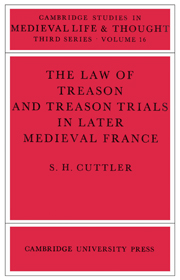Book contents
- Frontmatter
- Contents
- Dedication
- Preface
- Abbreviations
- Introduction
- 1 THE CONCEPT OF TREASON IN LATER MEDIEVAL FRANCE: LEGISTS, ‘COUTUMIERS’ AND TREATISE-WRITERS
- 2 THE CRIMES OF TREASON
- 3 JURISDICTION
- 4 PROCEDURE AND THE TRIAL OF PEERS
- 5 PUNISHMENT, FORFEITURE AND PARDON
- 6 TREASON AND THE CROWN 1328–1356
- 7 TREASON AND THE CROWN 1356–1380
- 8 TREASON AND THE CROWN 1380–1422
- 9 TREASON AND THE CROWN 1422–1461
- 10 TREASON AND THE CROWN 1461–1494
- Conclusion
- Bibliography
- Index
4 - PROCEDURE AND THE TRIAL OF PEERS
Published online by Cambridge University Press: 13 October 2009
- Frontmatter
- Contents
- Dedication
- Preface
- Abbreviations
- Introduction
- 1 THE CONCEPT OF TREASON IN LATER MEDIEVAL FRANCE: LEGISTS, ‘COUTUMIERS’ AND TREATISE-WRITERS
- 2 THE CRIMES OF TREASON
- 3 JURISDICTION
- 4 PROCEDURE AND THE TRIAL OF PEERS
- 5 PUNISHMENT, FORFEITURE AND PARDON
- 6 TREASON AND THE CROWN 1328–1356
- 7 TREASON AND THE CROWN 1356–1380
- 8 TREASON AND THE CROWN 1380–1422
- 9 TREASON AND THE CROWN 1422–1461
- 10 TREASON AND THE CROWN 1461–1494
- Conclusion
- Bibliography
- Index
Summary
There was no single procedure in the prosecution of treason in later medieval France that was followed to the exclusion of all others. Generally speaking, one can discern seven basic types of legal procedure: summary judgement; trial by battle; procédure ordinaire; procédure extraordinaire; trial before the king and council; state trials; and the trial of peers. Any combination of several factors could determine the manner of proceeding: the tribunal before which a case was tried; the status of the accused; the nature of the treason; the evidence; or the political desiderata of the crown.
‘By denunciation, present misdeed, accusation by formal party, and public notoriety’: the prosecution of treason, like that of other felonies, could be initiated for any one of these reasons. The most simple and sure way of proceeding was of course summarily. As we learned in the last chapter, the kings of France could have capital sentences adjudged on their own record, but after the mid fourteenth century they exercised this prerogative in military rather than in political cases.
Apart from the kings it was characteristically the military officers of the crown and their subordinates who meted out summary punishment. The treasons for which they had jurisdiction were mostly those committed under the law of arms, though of course there were exceptions. On 14 April 1477, for example, seventeen burgesses of Arras who had tried to meet secretly with Mary of Burgundy were executed by order of the provost-marshal Tristan l'Hermite. Non-military commissioners, particularly those with power to prosecute urban revolts, could also be mandated to proceed summarily to judgement.
- Type
- Chapter
- Information
- Publisher: Cambridge University PressPrint publication year: 1982

